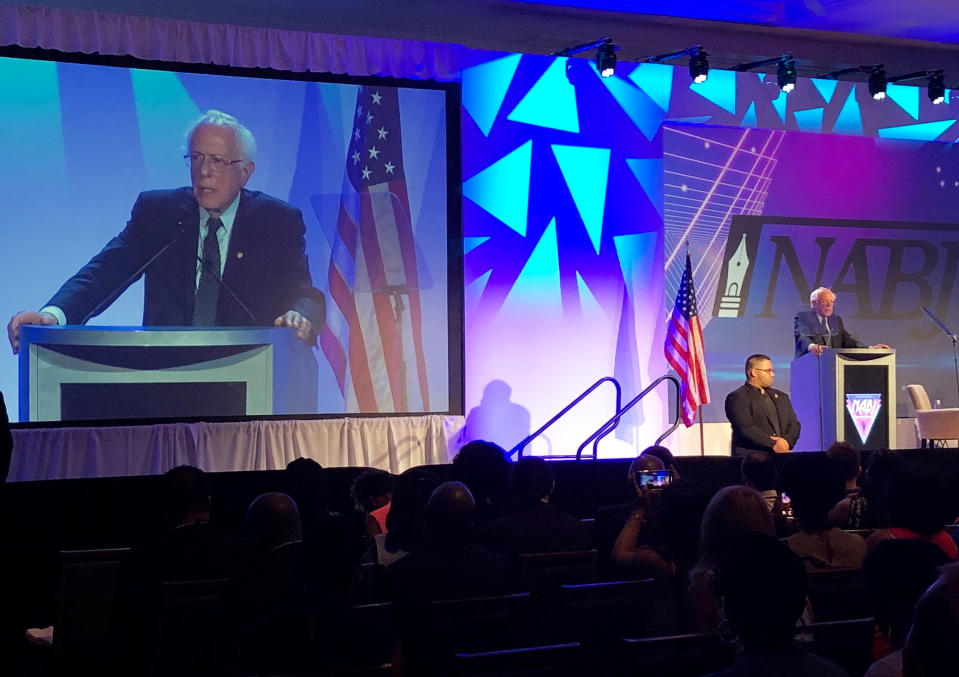Bernie Sanders: Tax the rich to pay for Medicare for All (and everything else)
Vermont Senator Bernie Sanders said the U.S. could afford universal healthcare, canceling student debt and making tuition free at public colleges— by slapping higher taxes on wealthy individuals and big companies in order to pay for it all.
Addressing a room in Miami on Thursday at the annual National Association of Black Journalists (NABJ) Convention, the 2020 Democratic presidential contender elaborated on his campaign proposal to cancel federal student loans for 45 million Americans, and make public higher education free.
These proposals aren’t cheap: In total, both plans would cost American taxpayers somewhere in the range of $30- 40 trillion over the next decade, according to independent estimates.
Sanders hasn’t been entirely clear on how the measures would be funded, but the Senator pushed for progressive tax policies on the rich.

“We have to pay for this through public financing and come up with a progressive tax system,” Sanders said to a packed room. “The wealthy and the corporations are going to pay more.”
Currently, healthcare in the United States costs nearly $4 trillion a year, according to the Centers for Medicare and Medicaid Services (CMS). CMS estimates that this translates into nearly $10,800 per person in the country. In 2017, healthcare spending grew by 3.9%.
Sanders explained that the cost of his plan is similar to what Americans are already paying for healthcare. “‘Medicare for All’ will cost the American people less than the current dysfunctional system.”
He added that “it will cost the majority less than they already pay.”
Taxes on the wealthy will also cover his plan to cancel student loan debt — including loans taken out by the wealthy, Sanders said, as he blasted large banks that were bailed out by the government during the 2008 crisis.
“How is it,” Sanders asked, “that Wall Street got $700 billion in bailouts and trillions in zero interest loans?” He contrasted that to young college graduates struggling under the burden of student loan debt.
Robin hood tax
The United States is in the grips of a student loan crisis, with more than $1.6 trillion owed by the American people, according to the Federal Reserve. Student loans have caused parents to go into debt, and delayed millennials from buying homes by nearly 8 years, according to some estimates.
Making public colleges and universities tuition free is the cheapest of the Senator’s proposals, costing an estimated $47 billion, according to his “College for All Act” summary.
In total, Sanders says that his initiatives will cost $2.2 trillion over the next ten years.
By adding what he described as a “small tax” on “Wall Street speculation,” Sanders argues the funds raised would “more than cover” tuition for public colleges, as well as wiping out student loan debt.
Called the “Robin Hood” tax, Sanders proposal places a “fee on investment houses, hedge funds, and other speculators,” on stock trades. The plan would aim to raise ‘hundreds of billions a year,” according to draft legislative
“It has been estimated that this provision could raise hundreds of billions a year which could be used not only to make tuition free at public colleges and universities in this country, it could also be used to create millions of jobs and rebuild the middle class of this country,” according to draft legislation.
“We are prepared to tell Wall Street,” the Senator said, “they can no longer determine all that happens in this country.”
Kristin Myers is a reporter at Yahoo Finance. Follow her on Twitter.
Read more:
‘Baby bonds’ bill aims to give children up to $50,000 to start adulthood
Keeping children in ‘cages’ costs American taxpayers more than $4.5 million daily
Follow Yahoo Finance on Twitter, Facebook, Instagram, Flipboard, LinkedIn, YouTube, and reddit.
Read the latest financial and business news from Yahoo Finance
